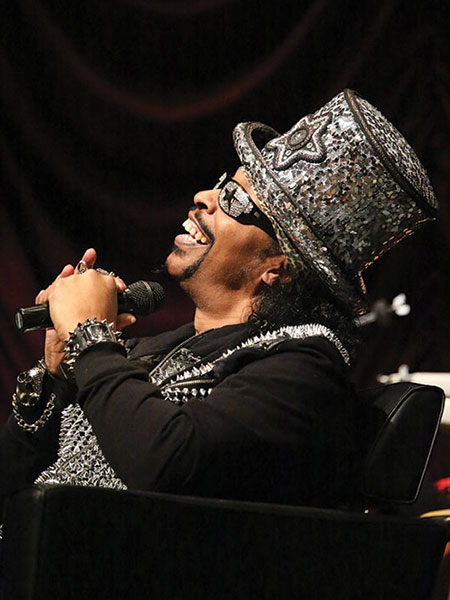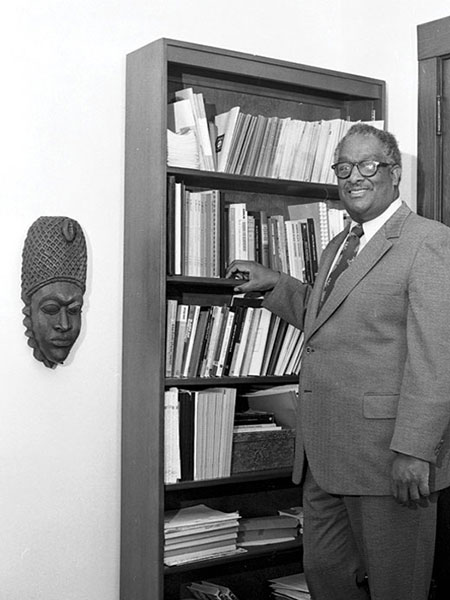Bootsy Boogies with IU

“Yabba dabba doo! Bootzilla is here!”
With that funkadelic introduction, genre-defining funk bassist Bootsy Collins brought his signature starry-eyed swagger to the IU tune “Indiana Fight.” Collins remixed the song this past spring, but his relationship with IU began more than a year before.
In March 2018, Collins visited IU to talk “funkology” during a speaking event presented by the Archives of African American Music and Culture. His brief campus visit quickly blossomed into a musical friendship with IU, particularly with the talented student performers in the African American Arts Institute’s (AAAI) IU Soul Revue.
After watching the ensemble rehearse a medley of his hits, it was Collins who was starstruck.
“Somebody told me, ‘Oh, the band is great!’ And it’s like—you hear about millions of bands, so I didn’t think nothing of it,” said Collins. “And the next thing I know … I came down to rehearsal and was like, ‘Oh! That’s what y’all are doing up here!’”
A few months later, at Collins’s request, the IU Soul Revue served as the opening act alongside the legend at the Cincinnati Music Festival.
“It’s the chance of a lifetime,” said Shai Warfield-Cross, former Soul Revue vocalist and senior majoring in theatre.

Collins isn’t the first legendary artist to cross paths with the Soul Revue. The group has opened for world-renowned acts such as The Temptations, James Brown, Booker T. Jones, and The Emotions. Last April, when the ensemble traveled to Los Angeles to make its West Coast debut, the students visited Kenneth “Babyface” Edmonds for a tour of his recording studio and even performed for Toni Braxton via FaceTime. That professional pedigree can’t help but motivate the Soul Revue’s young performers.
“Toni Braxton is someone that I’ve idolized and admired since I was little,” said Raven Curry, IU Soul Revue vocalist and sophomore majoring in international studies. “It was amazing to sing for her … I cried so hard afterwards.”
Such opportunities are a testament to the ensemble’s talent and hard work, as well as the unique experiences offered through the AAAI.
Founded in 1974 by Herman Hudson, former vice chancellor for African American Affairs, the AAAI comprises three performance ensembles: the IU Soul Revue, the African American Dance Company, and the African American Choral Ensemble. The institute is the nation’s first and only credit-bearing program dedicated to the performance and promotion of Black music and dance.
As the ensembles’ reputations have grown, so too have opportunities like the one with Collins, who isn’t shy about his affection for the Soul Revue.
“It makes me feel good to do what James Brown did for me. He opened the door for me. And once he opened the door, I was all up in it. The same could be for any one of these kids. And that is what does my heart proud.”
In January 2019, after decades of performing, Collins announced he’s hanging up his bass—at least during live performances. But he can take comfort knowing that the AAAI and the IU Soul Revue are keeping the funk alive.
Another Visionary Herman at IU

Growing up, Herman Hudson learned to ride a bicycle, as kids commonly do. Only for Hudson, who was legally blind, the skill took more determination to master.
“I think that’s emblematic of what he was like as a person. He was not to be deterred when he set his mind to things,” says Charles Sykes, executive director of the AAAI, who was hired by Hudson in 1991.
It was Hudson’s determination and vision that helped him become IU’s vice chancellor for African American Affairs in 1970. He was appointed by IU’s other beloved Herman, Herman B Wells. At a time when universities around the country were making efforts to increase opportunities for people of color, Hudson founded what is today known as the Department of African American and African Diaspora Studies.
By establishing the AAAI (with the help of executive director Lillian Dunlap), Hudson created a program that was the first of its kind in the United States, with academic courses focused on the study and performance of Black music and dance.
Then he went a step further.
“While Black studies in most universities focused on courses in history, literature, and politics, Hudson saw the potential value of the performing arts as part of the educational experience. The ensembles he created allow students to explore their talents and interest in performance while majoring in any subject across IU’s curriculum,” explained Sykes.
Decades later, Hudson’s work is still enriching the IU community and empowering IU students.
This article was originally published in the fall 2019 issue of Imagine magazine.
Written By
A. Price
A resident of the Hoosier state since grade school, Alex forged a friendship with “tried and true” IU upon becoming a writer at the IU Foundation.